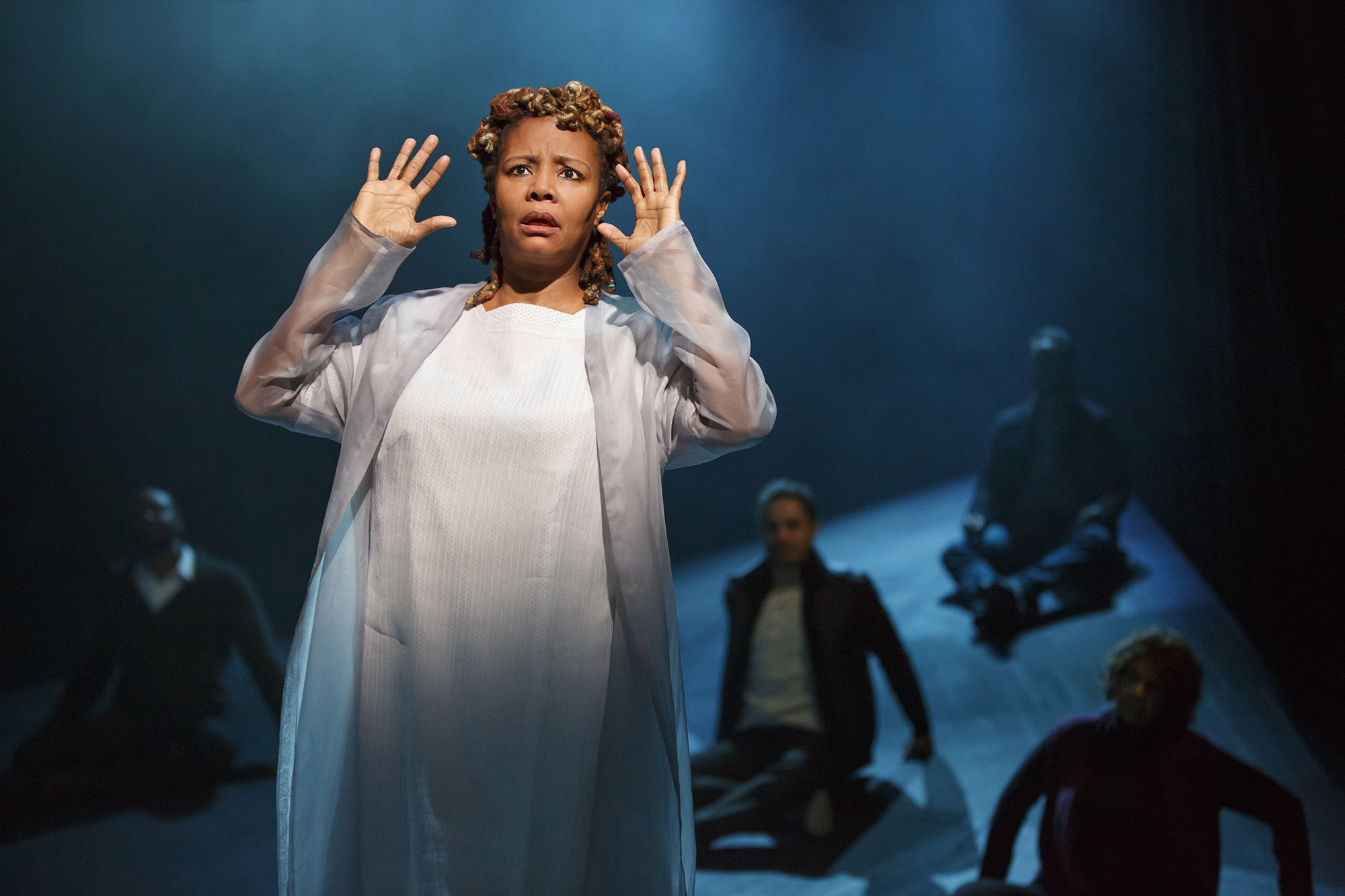Review of Dutch Masters at Yale Cabaret
Two teens on a New York subway riding up through Harlem in the 1990s. One an aggressively outgoing black kid, Eric (Leland Fowler), the other a timid and anxious white kid, Steve (Edmund Donovan). In the course of the play both will expose a lot about themselves, and they also expose a lot about the nexus of class, race, privilege that defines social boundaries in our times. How close to friendship can these two really be, even though (we learn) that Steve is an enthusiast of black popular culture, such as rap and Richard Pryor and famous black athletes? The divide between them, which is obvious enough from the start, as Steve tries to stay on Eric’s good side, allowing himself to be intimidated into leaving the train to smoke a blunt with his new pal, becomes more marked when we learn of a connection between them in the past.
At that point, with Steve now Eric’s guest, of sorts, new anxieties surface because of the many ways in which Steve might offend his host, who is exposing anxieties of his own. It’s then that this gripping play, full of wonderful back and forth dialogue and resounding portrayals of the young protagonists by Fowler and Donovan, begins to push things a bit for the sake of dramatic effect. It gets manipulative, but retains—in Luke Harlan’s clear directorial grasp—a focus on the possibilities these characters suggest. Though I’d prefer a denouement in which they who could get down to cases without waving weapons around, Keller’s sense of how “the street” makes its presence felt in any meeting between characters like these keeps the shocks plausible. There are inconsistencies, but nothing too damning. Unlike LeRoi Jones’ Dutchman, which it echoes initially, Keller’s play stays within the bounds of naturalism in a situation where one stranger can play a head-trip on another, particularly when one of the two knows a lot more than he tells at first.
Leland Fowler (Eric), Edmund Donovan (Steve); photo by Christopher Thompson
The actors in the show are nothing short of amazing. As the mercurial Eric, Fowler has to run through a vast range of attitudes, putting the audience and Steve on guard and then disarming both. He’s amusing and looking to be amused, but he’s also shrewd, knowing, forthright, and occasionally menacing, if only in fun. He could be a con man or he could be someone trying to establish his credibility. He’s sort of the worst nightmare of any insecure white kid trying to maintain some sense of street cred on black turf, and Donovan has Eric down all the way: slack-mouthed, eager to be (and used to being) liked, curious, seemingly open but really closed-off in ways that his evening with Eric will bring to the fore. His stoned call to his mother’s voice-mail is both comic and sad, and that’s the way much of the interaction plays out here. Until it gets very emotional.
A good case in point about the tone of Keller’s dialogue—that I can cite without giving too much away—is the conversation about Dutch Masters that the boys get into while smoking the powerful blunt Eric rolls using the familiar cigar brand as his rolling papers. He points out, rightly, that the Dutch were “masters” through the slave trade. Steve thinks the name is a reference to Dutch masters of painting, such as Rembrandt, whose painting of the masters of the drapers’ guild graces the packaging. Both concede they might be wrong, but Eric sees the irony in rappers referencing “dutches” as part of their lingo, sort of turning the tables on “the masters.” Inspired by their shared laughter, Steve tells a story of how some black kids struck him when his high school basketball team came to their school. It’s an effort to ingratiate himself—a black kid on his team helps him keep his cool—but falls flat because who is “master” of a situation, such as the conversation itself, is at stake.
Much in the dialogue works that way with signals misread or misdirected and even seemingly genuine emotion “staged” to make the other character react. If either actor were less likable, we might be willing to side with the other, but each keeps us hoping that there will be some way they might find an “us against them” ground of shared fellowship. Occasionally such possibilities flit across their faces, but there’s always some other claim to be made against it. Is it a claim made by pride, by social injustice, by racism, by duty towards their moms or their peers, or by distaste with having to make allowances, or with false feeling? Keller’s script contains a wide range of reasons these two could and should be uncomfortable with each other and plays on hopes that they’ll work it out somehow, and even hopes some might have for a more shattering comeuppance for one character or the other.
The set by Choul Lee, consisting of three main playing spaces—subway, park, and “livingroom”—are spread out in the Cab’s small space and help to underline that these are three distinct areas to be explored. The boys are strangers on the subway, together in the park, and either friends or enemies by the end of their time in the room. Dutch Masters is a lively play, masterfully staged, and is likely to get people talking.
Dutch Masters
By Greg Keller
Directed by Luke Harlan
Dramaturg: Taylor Barfield; Scenic Designer: Choul Lee; Costume Designer: Edmund Donovan; Lighting Designer: Krista Smith; Co-Sound Designer: Matthew Fischer; Co-Sound Designer: Ian Scot; Stage Manager: Sarah Thompson; Producer: Libby Peterson
Yale Cabaret
February 25-27, 2016








